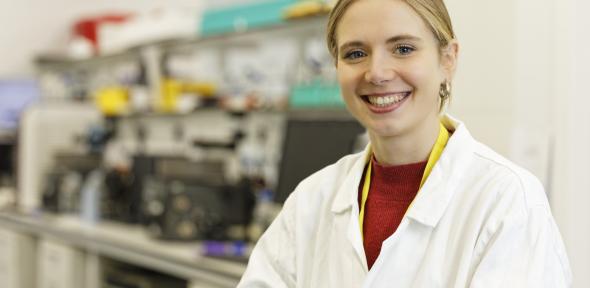
The Industrial Cooperative Awards in Science and Technology programme funds students to undertake research in research collaborations between academic and partner organisations. In my case, I was given the opportunity to split my lab work between the Department of Chemistry and AstraZeneca.
So in October 2019, I started my BBSRC iCASE PhD studentship jointly supervised by Professor Gonçalo Bernardes in the Department of Chemistry and Dr Peter Ravn (followed by Dr Monika Papworth) at AstraZeneca.
Here, I describe my own experience of completing an industry-linked PhD.
Life in the lab
.jpg)
Libby Brown in the lab, taken by Nathan Pitt ©University of Cambridge.
My research focuses on the construction of phage display libraries, to help identify new proteins or peptides that bind with high affinity to a therapeutic target of interest. Treatments for rheumatoid arthritis, lung cancer, psoriasis and inflammatory bowel disease have been discovered using this high throughput screening technique.
To further increase binding affinity, phage-displayed peptides can be cyclised, to reduce the entropic penalty of target binding. Over the past four years, I have been developing new chemical methods for cyclising peptides that are compatible with the phage display screening process.
Whilst I have enjoyed working on a project with clear practical applications such as drug discovery, others may prefer a more academic style of research, ie, research for the sake of learning. And as is often the case with industry-linked PhDs, approval is required to present at conferences or publish interesting findings, which some may find restrictive.
My usual day includes a lot of lab work but also a little bit of computational data analysis on the side. I am mainly based at AstraZeneca’s Granta Park labs, located just south of Cambridge. The facilities are great, and I have access to all the high-tech equipment needed to perform phage display experiments.
Although I don’t spend much time completing lab work in the Department of Chemistry, I still pop over for interesting talks and to teach undergraduate supervisions.
Time management
.jpg)
Libby Brown outside the AstraZeneca building, taken by Nathan Pitt ©University of Cambridge.
A joint university-industry PhD requires excellent time management. I have had to complete university and industry training courses, attend multiple group meetings (sometimes on the same day) and meet regularly with both my academic and industrial supervisor.
I discovered it can be difficult to arrange meetings when people from different industries and professions have different time commitments! But this experience has helped me develop my communication and organisational skills to bridge the gap between my academic supervisor, industrial supervisor and other collaborators.
Working hours
Unlike the Department of Chemistry, AstraZeneca is not open late at night or at the weekend, so my working hours tend to be 9 to 5, Monday to Friday. This means I have less flexibility in when I work than a standard PhD student, so I have had to learn to plan my experiments carefully and work efficiently.
On the plus side, this leaves lots of time to participate in extra-curricular activities (I run for the university) and attend events at my college (Jesus).
What’s next?
I will be submitting my PhD in September this year. While there is no guarantee of a job at the end of an industry-based PhD, AstraZeneca has invested time and money in teaching me the experimental and transferable skills that they deem important.
By interacting with employees across the business, I have established a good professional network for career advice and interview practice. Together, these factors give me confidence as I apply to jobs at biotech and pharmaceutical companies (hopefully doing more phage display!).
To summarise...
I have thoroughly enjoyed my joint Cambridge University-AstraZeneca PhD. I have worked on a project that has clear practical applications, had access to state-of-the-art technology and developed a good understanding of the entire drug development process from start to finish.
Through both the university and AstraZeneca, I have had the opportunity to meet and work with some incredible scientists who have provided me with support and guidance throughout my PhD.

